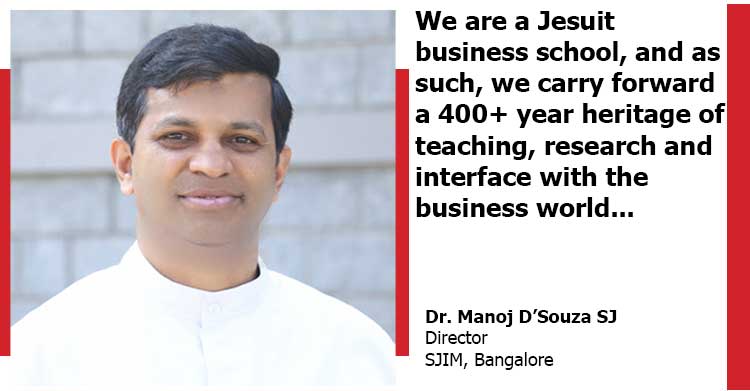We are a Jesuit business school, and as such, we carry forward a 400+ year heritage of teaching, research and interface with the business world… An interview with Dr. Manoj D’Souza SJ | Director | SJIM, Bangalore

Q1. SJIM is the oldest business school in Karnataka having a legacy of Fifty years. How does your educational module guarantee best practices of Industry?
You are right in pointing out that SJIM is Karnataka’s oldest business school. Let me also point out that, during the last fifty years, we have also been consistently ranked in the top 100 business schools in India in a variety of rankings. We survive, and continue to thrive as a business school, because we are constantly benchmarking our educational practices against the industry-wide practices, as reflected in our rankings, and because we innovate ahead of the curve.
For example, when we, in the 1960s and 70s, offered our post graduate diploma in management to the many young managers in Bangalore’s public sectors, business education was in its infancy, not just in India, but across the world. So, at that time, we were one of the few institutes globally offering such a program. Since then, we have continued to modernize our course offerings, in our pedagogy and in our program experience. As one instance, when COVID-19 suddenly and forcibly pushed education online, it may have been a rude shift for many business schools. But we at SJIM could make the shift seamlessly and successfully because we had, for several years, already harnessed cutting edge technology in our on-campus classes, so we were quite familiar with the pedagogical technology available.
Q2. What makes the faculty at SJIM, Bangalore a class apart? How do you inculcate the spirit of lifelong learning in them?
I would attribute this to Jesuit culture, which pervades what we do here at SJIM. We are a Jesuit business school, and as such, we carry forward a 400+ year heritage of teaching, research and interface with the business world. Our faculty are drawn from world-leading business schools. For example, our senior most professor, Rev. Dr. Oswald Mascarenhas SJ, has an MBA and PhD from Wharton Business School, which, as you know, is the world’s best business school. Our faculty are not only good teachers, but remain active in research and industry interface. We hire the best and provide an encouraging work environment: the rest follows. The faculty members motivate themselves to stay current, and also to contribute to new initiatives at the institute.
Q3. What are your perspectives with respect to the current Education framework in India? What are the big hallenges in Higher education in India?
The biggest challenge for us, in the Indian business school space, is to equip our students with the skills to succeed in an AI-enhanced world. If we don’t, many young people are going to find themselves out of a job very soon. What this means is for us to stimulate critical thinking and creativity through our curriculum and to do so within the ambits of the regulatory authorities.
Q4. Online learning is fairly a new concept in India especially when it comes to Higher education. What kind of readiness in terms of technology, mindset etc do require to make the most out of Online Learning?
At SJIM, we are very clear about one thing: you cannot simply take offline class material and deliver them online and expect to be effective. Yes, the syllabus and the duration of the courses are the same, but that’s where the similarity ends. You need to be familiar with the tools technology offers you – and I must say there were several organizations including Microsoft, Course Era and Google giving educational institutions many free resources during the pandemic, which helped enormously. But you also need to think of the social ecosystem of an online class and re-develop your entire course structure and delivery module. I am happy to point out that we did this in several courses at SJIM during the pandemic.
Q5. The education system in India is very different from the education system in the other countries. Often, the Indian education is criticized for not providing a diverse platform to students where they get an opportunity of learning practically. Do you agree? What is your opinion and advise in this regard?
There are lacunae in the Indian education system, but there really is no perfect educational system anywhere. If students are over-invested in learning by doing, they may suffer a lack of breadth, and this may reduce the flexibility they have in their careers. At SJIM, we emphasize breadth. At the same time, we give students many opportunities to learn practically, such as through cases and simulations of real-life business scenarios. We are one of the few Indian business schools with an unlimited HBSP subscription, which means that our faculty members have the freedom to offer our students as many Harvard Business cases, readings and simulations as they deem necessary. We also have guest lectures in every elective, industry visits in relevant subjects, four discipline-wise expert conclaves, international business-related projects and competitions, an annual international conference of practitioners and researchers and an entrepreneurship cell which provides mentoring and seed funding. So our students have plenty of practical learning opportunities.


